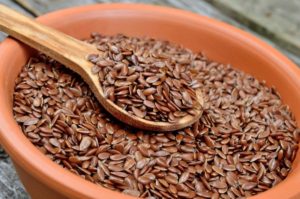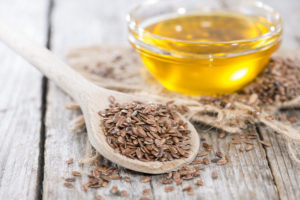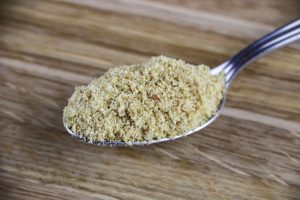The flaxseed has only been recognized for all the wonderful health benefits in the last few decades even though it has been cultivated for their health benefits for 5000 years!
Flaxseeds are a great addition to meals and for baking as an egg replacer! Learn more about this wonderful superfood.
Flaxseed Health Benefits
1. Flaxseeds Omega-3 Essential Fatty Acids Reduce Inflammation
- Many chronic diseases (heart disease, arthritis, asthma, diabetes) are developed from too much inflammation; this is enhanced by having too little Omega-3 intake. Flaxseed oil can be a real help.
Benefits of essential fatty acids
- increases “good” Cholesterol levels
- organ health
- keep joints supple
- a healthy brain; very important when a child’s brain grows the fastest, in utero and during infancy.
- a healthy heart and arteries
- can nourish the immune system
- help keep bones strong
- for a smooth skin
2. Flaxseed Lignans Fight Cancer, Infection, and More
- Reduce Prostate Cancer: Research studies show lignans can slow the growth of prostate cancer cells.
- Help with Breast Cancer Survival: Three studies followed thousands of women diagnosed with breast cancer were published at PubMed Central® 1. 2. 3. They found “Lignans might play an important role in reducing all-cause and cancer-specific mortality of the patients operated on for breast cancer.”
- Lignans seem to have antibacterial, antifungal, and antiviral properties.
- Lignans may reduce pre-menopausal symptoms, promote fertility and prevent Type 2 diabetes.
3. One of the foods highest in soluble and insoluble fibre; 4 Tbsp flax meal = 8 grams of fiber.
- Excellent for detoxing of the body. They contain a gummy soluble fiber called mucilage which protects intestinal flora.
- Helps keep bowel movements regular eliminating toxins.
- Blocks excess acidity thus improves digestion.
- The fibre has cholesterol-lowering effects.
- The high fiber helps stabilize blood sugar.
“Wherever flaxseed becomes a regular food item among the people, there will be better health,” Mahatma Gandhi.
4. Flaxseed Meal is Low Carb, Low Glycemic Index, and Gluten-Free
- Although flaxseeds are not a grain, they have a similar vitamin and mineral profile and are often used in grain type recipes.
- For those on a low carbohydrate diet, or a gluten free diet, flaxseed meal is perfectly safe. It has a low glycemic index of 32 and with it’s high fiber is good for weight loss.

Flaxseed Trivia
- Hippocrates used flaxseed for the relief of intestinal discomfort.
- The Egyptians used linen (made from flax seed) to wrap their mummies.
- Christ wore linen in his tomb. Homer tells of sails made of linen in his Odyssey.
- Laws were passed requiring people to consume flax seeds for its health benefits by King Charlemagne in the 8th century.
- Flax was one of the original medicines, used by Hippocrates himself.
- Some flax varieties are grown for oil, some for their fiber to make linen.
Flaxseed History
- In Switzerland, flax remnants were found in Stone Age dwellings.
- Flaxseed was cultivated in Babylon, around 3000 BC.
- In the 8th century, King Charlemagne passed laws requiring his subjects to consume it because he believed in its health benefits.
Flaxseed Nutrition
- Contains high-quality protein; 4 Tbsp flax meal = 6 grams of protein.
- Contain vitamins B-1, B-2, C, E, and carotene.
- Contain many minerals (iron, zinc, and trace amounts of potassium, magnesium, phosphorus, and calcium)
- Has vitamin E and carotene, two nutrients which aid the metabolism of the oil.
- Contain over a hundred times more of a phytonutrient lignin, than high lignin food such as wheat bran, buckwheat, rye, millet, oats, and soybeans.

How To Get Flaxseeds Into Your Diet
First, you need to know the varieties of flaxseeds and the forms they come in.
There are two varieties of flaxseeds for consumption; golden and brown flaxseeds.
Brown flaxseed has only slightly more nutrients, so for cooking, I prefer the golden flaxseed as it is lighter in flavour and easier to sneak into my baking.
There are three forms of flaxseeds:
- Raw whole flaxseeds
- Flaxseed Meal
- Flaxseed oil
Next, we need to get some into our kitchen and for most of us, that means going to the supermarket or health food store. Not many of us grow flaxseeds.
How to Purchase Flaxseeds and Meal
Flaxseeds need to be ground into flax meal to make the nutrients available. No one will ever fully chew the seeds thus the whole seeds pass undigested through the intestines.
- Check to see the “Best Before” date on packaged flaxseeds and meal.
- The bag should be opaque and vacuum packed. Light and oxygen will accelerate the meal going rancid.
- Purchase from a source where you’re sure there is rapid turnover.
- Ideally, the meal should be refrigerated at the store.

How to Purchase Flaxseed Oil
Buy only refrigerated flaxseed oil stored in black containers and keep flax oil in the refrigerator with the lid on tight.
- It is important that it is cold pressed and organic.
- Minimize exposure to heat, light, and air to minimize the oil going rancid.
- Buy flaxseed oil in smaller containers, depending on how fast you use it as the oil easily turns rancid.
How to Store Flaxseeds and Meal Before They go Rancid
- Flaxseed meal, when packaged in a gas-flushed, light protective container and refrigerated after opening, will last 6-16 weeks.
- Whole flaxseeds will last for 6-12 months when stored in an airtight container in a dark, cool dry spot. When immediately refrigerated, they can last for 1-2 years.
- Conflicting information: some studies suggest that coarsely ground flax seeds can be stored at room temperature for up to 10 months, without spoilage or loss of the omega-3 fatty acid.
Flaxseeds have a mild nutty taste; if there is a bitter taste then they have gone bad and should be thrown out.
How to Add Flaxseed Oil to Your Diet:
- Never cook with flax oil! Any oil high in essential fatty acids are not good for cooking. The heat turns the healthy fats into toxic ones. Add flax oil to foods just before serving.
- Flax oil turns rancid quickly.
- Buy only refrigerated flax oil stored in black containers and keep flax oil in the refrigerator with the lid on tight.
- It is important that it is cold pressed and organic.
- Minimize exposure to heat, light, and air.
- Use within 6 weeks of opening the container; the oil easily turns rancid.
- Buy flax oil in smaller containers, depending on how fast you use it.
- Flax oil taken with other food can increase the nutritional value of other foods.
- Add the oil to your homemade salad dressings.
- You can pour a little on top of cooked vegetables and grains while they are already on your plate.
- Put some in your smoothies.
Caution about Flaxseeds:
ANY food if over consumed can affect you negatively. It depends on your overall health, your digestive health and how sensitive is your immune system.
If you have a delicate digestive system, start with low doses of flax meal to begin with (one tablespoon per day) and work up to two. If you have a significant digestive disorder, the fiber/laxative effect of flax could be serious. The National Institutes of Health recommends that people with bowel problems or disease should not consume flaxseed. People with strong digestive systems can eat up to five tablespoons per day with no problems.
Some researchers are concerned about the levels of cyanide compounds (cyanogenic glycosides) in flaxseed, but all studies so far have shown that they do not create the anticipated problems in the body.
Heat, especially on dry flax seeds, breaks these compounds down. U.S. government agencies say that 3 tablespoons of flaxseed meal is safe and is probably a good dose for health purposes.
How to Add Flaxseeds to Your Diet

Flaxseed Meal: Heat doesn’t have the same effect on whole flaxseeds. Studies testing omega-3 fat in baked goods found no significant loss of beneficial fats occurring. To get flax seeds in your meals and baking is in the form of flax meal.
Flaxseeds need to be ground into flax meal to make the nutrients available. No one will ever fully chew the seeds thus the whole seeds pass undigested through the intestines.
It is best for you to make your own for freshness and it is easy to do; see my video on How to Prepare Flax Seed Meal
Baking with Flaxseed Meal
Flaxseed meal is an important ingredient in my cakes, muffins, quick breads and cookies because all my baking is vegan meaning there are no eggs or milk. The flax meal helps to stick it all together.
It is a healthy substitute for xanthan gum or guar gum
Egg Replacer
1 Tbsp. Flaxseed meal (ground flax seeds)
3 Tbsp. Water
Mix flaxseed meal and water in a bowl and let it sit for two to three minutes to thicken it, before adding it to the recipe.
Fat replacer:
3 parts flaxseed meal for 1 part oil
Because you are flax meal contains lots of fiber then you need to adjust the flour mixture.
Baked goods with flax meal tend to brown more quickly than regular recipes, you may have to modify normal cooking times.]
READ Inflammation: Is it Good or Bad for Your Body?
We hear about inflammation often but do we really know what it is? Inflammation is an important immune system function. When it is out of control, it can cause serious damage. Inflammation has been linked to major diseases such as Alzheimer’s, arthritis, cancer, diabetes, heart disease, and signs of aging. There’s good news: many foods are naturally anti-inflammatory. Adding Natural Anti-Inflammatory Foods to your meals is a very good way to reduce inflammation. Antioxidants found in foods protect your cells from the effects of free radicals and can help reduce an overabundance of inflammation in your body.


thanks for the info its is of great help to my health
Thank for info it was helpful,I needed that
Dianna, I love reposting and sharing your research. The information is always informative and necessary for our health.
Thank you
Hi Diane, I must say that this article was so interesting on flax seeds. I used to have the oil, but after it was none that it contained cyanide, & I was told that you could only eat the whole seeds that were cooked, I decided to give it a miss, but now I will re-introduce it back into my life! Sometimes it is difficult to know when to eat which fat when, as I eat coconut oil/palm fruit oil/olive oil/ Those I use mainly, but can you use them together or must you use them separately – don’t different oils via for the receptor site in the body? & certain oils overpower others? I would appreciate a reply. By the way, I love your website, & in fact, trust you implicitly, because I know you do research on everything.
Hi Joy, apologies for the delayed reply.
You can use all of the oils together but personally I think it is better to use one at a time to give your body variety. Best never to eat or drink the same thing always.
Happy to hear you like this site and doing the research is certainly necessary.
Happy eating!
I’ve only learned about flaxseed recently when it was briefly mentioned in another blog post and I’ve been curious about it since then. I’m so glad I found this post I learned so much more from here, I like how detailed and specific the information that were stated. Flaxseed seems to have a lot of health benefits that anyone would love to have. I haven’t been to any store that sells any flaxseed products or maybe I already have I just didn’t pay attention to it but now I’m definitely keeping my eye out on it. Thanks so much for sharing this!
Regards,
Dennis